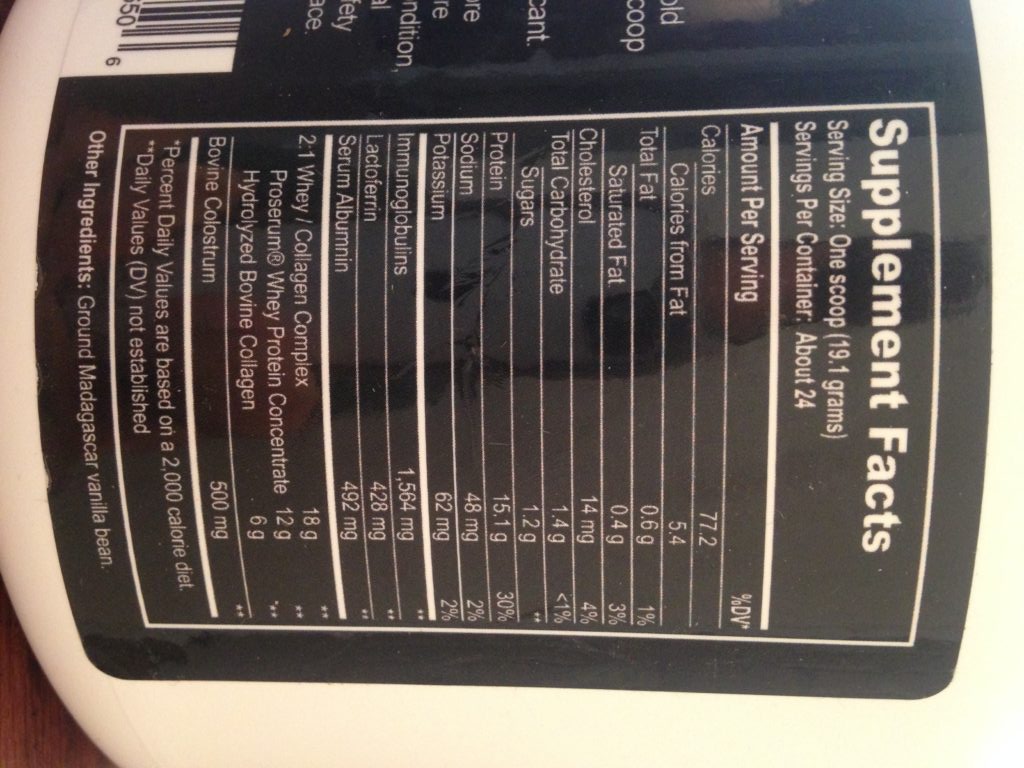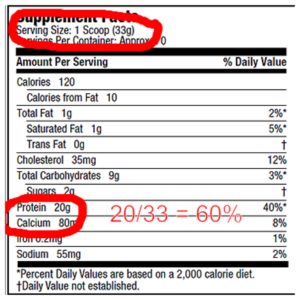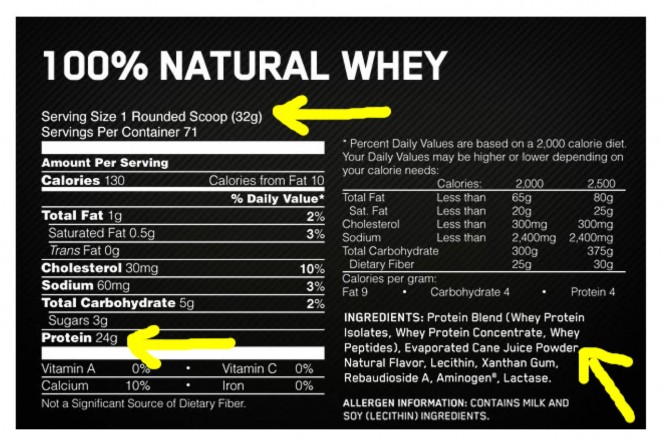I get asked all the time for suggestions and recommendations of which protein powder(s) to use. Let me tell you, there are some really awesome products out there. But there are even more products that are really terrible & huge wastes of money! I’m going to show you how to choose the right protein powder for yourself.
The first rule of protein club: The more hype you see in the ads or on the package, the bigger waste of money that product is. If that company truly cared about your success, they’d drop the marketing budget and spend that money on high quality ingredients that benefited YOU rather than their bottom line.
So, skip the marketing ads & hype, skip the package front, and head straight to the ingredients list and the nutrition label. That tells the real story of what you’re putting in your body.
What To Look For
The ingredient list should be as short as possible. We start with the protein itself – what type of protein (whey, collagen, casein, egg white, pea, hemp, etc) and what is the quality of the sourcing (is it grass-fed?, how was it processed?). Generally speaking, if a product doesn’t disclose this information, they don’t want you to know the answer. That makes it a no-go!
***A note on the dairy proteins whey and casein protein. PERSONALLY, I avoid dairy proteins. I use Ghee instead of grass-fed butter and I try to avoid whey protein as it makes me bloated, gassy and “filmy”. (The one exception to this is the Natural Stacks whey:collagen blend listed below.) Casein is also something I avoid. Coveted by bodybuilders for it’s slower absorption rate, casein’s slow and incomplete digestion actually wreaks havoc on the digetsive system, has a negative impact on opiod receptors and causes immune system flare-ups. The science is still debating this – but I know I felt better and performed better when I removed it from my diet. And that’s all I need to know. I do better without it. Remember, this about finding what works for YOU. More SCIENCE HERE & HERE.
After the main ingredient (protein), we look at the flavorings and sweeteners. We want as few additives as possible. Whatever additives are present, should be natural and “pronounceable”. If you are unable to pronounce it or don’t know what it is, that’s not a good sign!
Ideally these secondary ingredients should be natural and things you can pronounce – things likereal cocoa or vanilla, real Stevia for sweetener, sunflower lecithin for thickener/emulsifier. Check out the label below. This is Natural Stacks Protein, a protein I use and trust. Notice the nutritional info… Protein and ground vanilla bean – THAT’S IT!

Protein Content
Once you’re confident there is no BAD stuff in your potential protein source, it’s time to see how much of the good stuff you’re actually getting.
Using the label above, look at the serving size: 19 grams. In that 19g serving, you get 12g whey protein, 6g collagen protein, and 500mg colostrum. Let’s do the math: 12 + 6 + 0.5 = 18.5g. 18.5/19.1 = 96% Protein by weight. This is about as high as you’re going to find – and the highest quality!
Now for some examples of what NOT to get…
One popular bodybuilding brand has ridiculous photoshopped before and after photos of professional fitness models “gaining” 14 pounds of muscle in just a few weeks. Then when you read the label – the REAL LABEL – the one in the back, it says a 33g serving contains a whopping 20g Protein. Time for a math lesson:

20/33 = 60% This overpriced, overhyped “protein powder” is only 60% protein by weight. That means it is 40% something else…I don’t know about you, but I don’t want to waste my time or my efforts on something that is 60% of what I’m expecting!
Hidden Ingredients
And don’t be fooled by the words “natural”, “organic”, or the like. Check out this “Natural” protein powder label from a popular bodybuilding supplement company. It shows 24g protein per 32g serving, which is OK (24/32 = 75%) but notice the “evaporated cane juice powder” in the ingredients. What if I told you I had some evaporated ocean water powder?? That would be sea salt! So evaporated cane juice powder is a fancy way to try to sneak SUGAR past the unsuspecting consumer.

Recap
- Go straight to the ingredients and nutritional label. Look for high quality sources and types of protein that fit your dietary needs. If you’re buying protein powder, IT SHOULD BE PROTEIN! And it should be of the HIGHEST QUALITY! (Contrary to what the bodybuilding magazines say, quality trumps quantity here.)
- Fewer ingredients = better. Avoid products with added sugars or lots of fillers and things you can’t pronounce.
- Do the Protein Content math. Are you getting at least 80-85% protein by weight?
Protein Recommendations
Natural Stacks Protein (2:1 Whey:Collagen + Colostrum)
Bulletproof Collagen + Gelatin
Egg White Protein from Healthy ‘N Fit or Jay Robb
Custom order sites like True Nutrition or Protein Factory also have quality options.